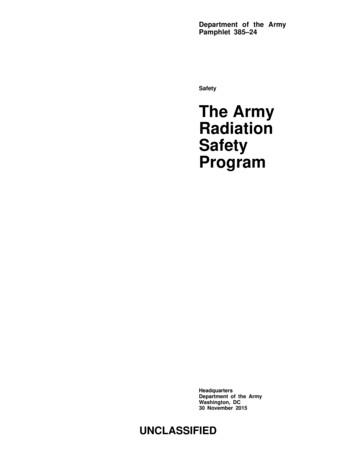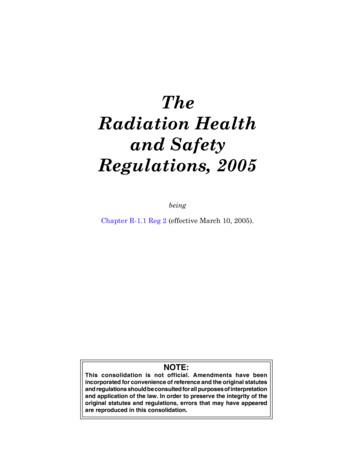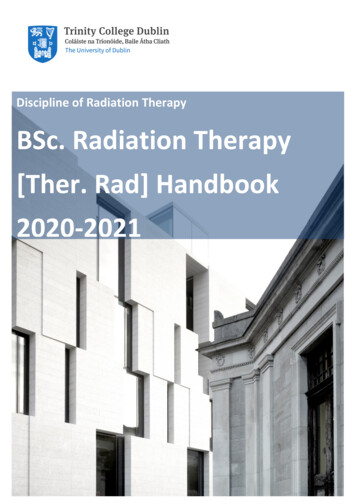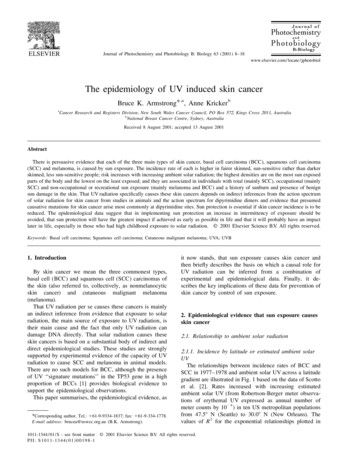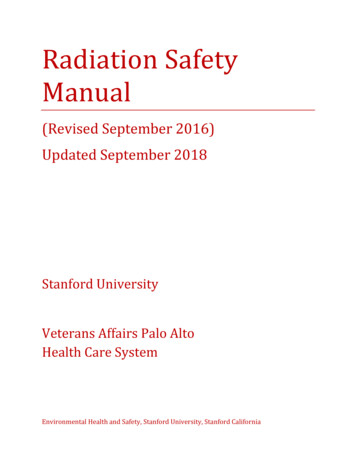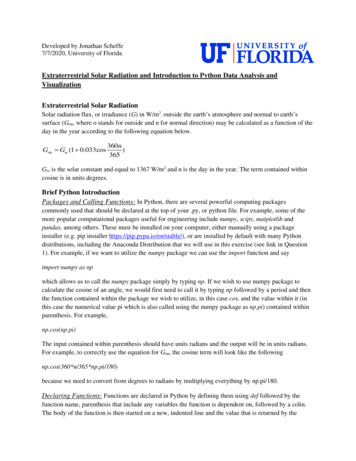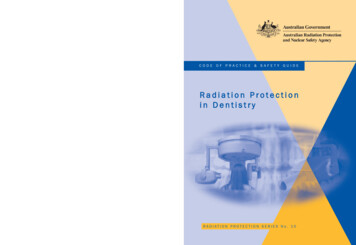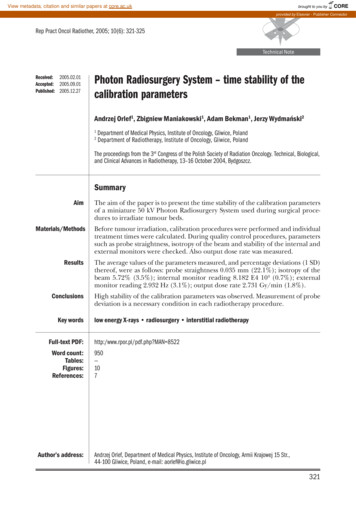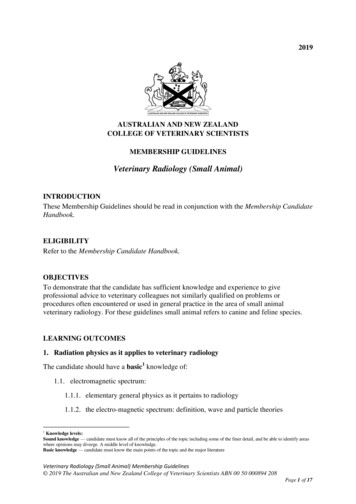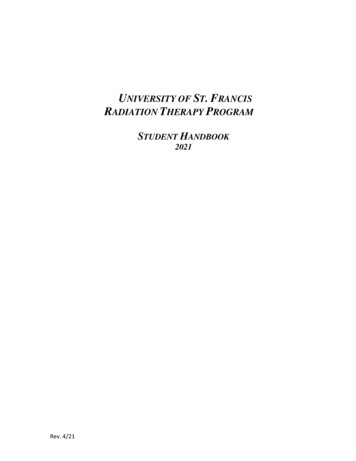
Transcription
UNIVERSITY OF ST. FRANCISRADIATION THERAPY PROGRAMSTUDENT HANDBOOK2021Rev. 4/21
Radiation Therapy ProgramStudent HandbookTable of ContentspageSectionCategory Listed in the Section1-4Section 1:Verification FormsOrientationSexual Harassment Policy VerificationSubstance Abuse Policy VerificationPregnancy Policy VerificationRadiation Protection Guidelines VerificationSection 2:Welcome and GeneralProfession InformationWelcome StatementIntroduction to ProfessionIntroduction to School and Clinical AffiliatesGeneral Program InformationDescription of the ProfessionGraduation Requirements1012Mission and goals146Section 3: Program Missionand GoalsSection 4: FacultyFaculty and Committee Members16-17Admission Policy19-21Section5:Admission Policies andProceduresSection 6:Essential FunctionsEssential Functions of a Radiation Therapist23Academic CreditTransfer CreditAttendance PolicyStudent RecordsPregnancySexual Harassment PolicyPhone and Printer UseStudent Employment26Section 7:School Policies andProceduresRev. 4/2131
Student AttireRev. 4/21
Radiation Exposure MonitoringStudent WithdrawalIdentification Badges and Car StickersSmokingStudent Orientation and In-servicesRadiation Oncology Department meetingsExecutive Advisory CommitteeClinical Education CommitteeRadiologic Sciences Advisory CommitteeGrievance CommitteeProfessionalismIncident ReportsCommunicable DiseasesSubstance Abuse37Section 8:Disciplinary issalDue ProcessSection 9Resources and Services3941School LibraryComputerHospital LibraryTutoring/Remedial InstructionCounseling and Student AdvisingFacultyCareer Planning and Graduate PlacementHealth Information42Book fees45Registration and TuitionPre-entrance Physical ExamFinancial AidRefund PoliciesInsuranceProfessional ActivitiesOther Student Expenses47Section 10: Costs andRefundsRev. 4/21
Section 11: AcademicPolicies and CourseDescriptionsRev. 4/21
Didactic InstructionCurriculum Element GuidelinesGrading PolicyAcademic CounselingAcademic Probation / Grading ScaleScheduling of coursesCredit HoursCourse Descriptions47General PlanSupervisionEvaluationClinical Rotation Schedules56Course Sequence Phase I-IVProgram Calendar5951Section 12:Clinical EducationGuidelinesSection 13:Didactic Course SchedulesSection 14: Pre-requisiteCoursesProgram CurriculumPre-Professional EducationTransfer CreditPre-Professional at USFPre-Professional at RVCRev. 4/21
SectionSection 15: Students Rightsand ResponsibilitiesCategory Listed in the SectionStudent Rights and ResponsibilitiesSection 16:Appendix (distributed duringorientation)Outcomes Assessment PlanAnnual CalendarRadiation TherapyRev. 4/215
Program HandbookTable Contents 6/00 DRM,8/03 ll,8/04, 08/08, 08/10,7/12,5/18 llRev. 4/21
Verification FormsRadiation TherapyProgram Handbook7/99, 5/00 DRM,8/03,8/04,8/05,6/06,7/07, 07/08, 04/11,03/13,3/16,2/18,5/18,8/19 LL2
Radiation TherapyVerification of Receipt and Review of PolicyThe student will sign all sections that apply to them as an enrolled student.VERIFICATION OF ORIENTATIONI have received and read the Radiation Therapy Student Handbook. I have also been present at a formalorientation to the university. The policies and procedures have been explained to me, and I agree to abideby all said policies. I understand that my continuance as a student here is contingent upon this agreement.Student’s Signature/DateProgram Director/ DateVERIFICATION OF SEXUAL HARASSMENT POLICYI have read and understood the Radiation Therapy program sexual harassment policy. These regulationsand guidelines have been explained to me, and I agree to abide by the content of the policy.Student’s signature/DateProgram Director/ DateVERIFICATION OF SUBSTANCE ABUSE POLICYI have received the Radiation Therapy program policy on substance abuse. These regulations andguidelines have been explained to me, and I agree to abide by the content of the policy.I furtherunderstand that this document will become part of my permanent record.Student’s signature/DateProgram Director/ DateRadiation TherapyProgram Handbook7/99, 5/00 DRM,8/03,8/04,8/05,6/06,7/07, 07/08, 04/11,03/13,3/16,2/18,5/18,8/19 LL3
VERIFICATION OF PREGNANCY POLICY:I have received and read the Radiation Therapy program pregnancy policy. This policy has beenexplained to me, and I agree to abide by the content of the policy.I further understand that thisdocument will become part of my permanent record.Student’s Signature/DateProgram Director/ DateVERIFICATION OF RADIATION PROTECTION GUIDELINESI have received the Radiation Therapy program guidelines and policies relating to radiation protection andexposure badge policies. Regulations and guidelines have been explained to me, and I agree to abide by thecontent of the policy. I further understand that exposure records accumulated while I am a student willbecome part of my permanent exposure record.Student’s signature/DateProgram Director/ DateVERIFICATION OF REVIEW OF TECHNICAL AND ETHICAL STANDARDSI have reviewed the American Society of Radiologic Technologists (ASRT) Practice Standards. To myknowledge, I am able to meet all physical demands. I intend to abide by stated ethical policies.Student’s signature/DateProgram Director/DateRadiation TherapyProgram Handbook7/99, 5/00 DRM,8/03,8/04,8/05,6/06,7/07, 07/08, 04/11,03/13,3/16,2/18,5/18,8/19 LL4
Welcome StatementGeneral ProfessionAndProgram DescriptionRadiation TherapyProgram Handbook7/99, 5/00 DRM,8/03,8/04,8/05,6/06,7/07, 07/08, 04/11,03/13,3/16,2/18,5/18,8/19 LL5
Welcome:We welcome you to the University of St. Francis’ Radiation Therapy program. This student handbook isdesigned to acquaint you with program and hospital setting policies and procedures. Use it as a guide andkeep it for reference during your enrollment. Any other questions will be answered by your programdirector as they arise.As an important member of the health care team, you will be expected to act in a responsible and professionalmanner. It is very important for you to comply with the policies set forth for you. We look forward tohaving you with us and hope that you find the radiation therapy program a challenging and rewardingexperience.The University and its Radiation Therapy program reserves the right to implement policies andprocedures at any time during the year. Each new policy will be made known to current students andas of that date, will be enforceable.Radiation TherapyProgram Handbook7/99, 5/00 DRM,8/03,8/04,8/05,6/06,7/07, 07/08, 04/11,03/13,3/16,2/18,5/18,8/19 LL6
INTRODUCTIONRADIATION ONCOLOGY *The complex nature of the cancer disease process involves multiple treatment modalities, with surgery,medical oncology and radiation oncology among the most common. Depending on the location,pathology and state of disease, these methods may be used singularly, in combination or in sequence.Radiation oncology employs ionizing radiation to destroy cancerous tumors while sparing surroundingtissue. An interdisciplinary team of radiation oncologists, radiation physicists, medical dosimetrists,radiation therapists, nurses and support staff plan and deliver the course of treatment. While each teammember plays a critical role in the delivery of health services, the radiation therapist administers the radiationto the patient throughout the treatment process.RADIATION THERAPIST*Radiation therapists assist in localizing tumors, participates in treatment planning and deliver high dosesof ionizing radiation prescribed by a radiation oncologist. Radiation therapists are the primary liaisonbetween patients and other members of the radiation oncology team. They also provide a link to otherhealth care providers, such as social workers and dietitians.Radiation therapy often involves daily treatments extending over several weeks. This treatment methoduses highly sophisticated equipment and requires a great deal of initial planning as well as constantpatient care and monitoring. Radiation therapists must maintain a high degree of accuracy and an awarenessof safety for patients, visitors, and team members. They also must remain sensitive to the physical andemotional needs of patients.Radiation therapists must demonstrate an understanding of cancer, radiation biology, radiation therapytechniques, equipment technology, radiation safety and the psychosocial aspects of cancer. The radiationtherapist uses professional judgment and critical thinking when assisting with treatment planning,recognizing and resolving equipment problems and treatment discrepancies, anticipating patient needsand concerns and determining when treatment should be withheld until a physician can be consulted.*(These statements are taken from the American Society of Radiologic Technology’s ( A S R T ) RadiationTherapyProfessional Curriculum Guide.)Students should review the ASRT Practice Standards document. Use the link below.ASRT Practice StandardsRadiation TherapyProgram Handbook7/99, 5/00 DRM,8/03,8/04,8/05,6/06,7/07, 07/08, 04/11,03/13,3/16,2/18,5/18,8/19 LL7
Overview of the ProgramThe program offers two tracks for qualified applicants: A 5-semester baccalaureate track and acondensed, 4-semester baccalaureate track for certified radiologic technologists.The program consists of clinical phases I-IV and five semesters, for the baccalaureate track student. Thestudent previously certified in radiography requires a condensed four semesters and clinical phases II – IV.The curriculum is designed to provide for balanced didactic and clinical components in order to producestudents with diversified education in radiation therapy.The didactic portion of the professional sequence is delivered on the campus of the University of St. Francis.Clinical assignments can be at any affiliated clinical site. However, program faculty attempts to arrangeclinical rotation assignments and coordinate classroom-meeting schedules that do not impose unduehardship on its enrolled students.The program has been developed to be consistent with the “Standards of an Accredited Educational Programfor Radiation Therapy", adopted by the American Society of Radiologic Technologists, as well as theStandards for Programs in Radiologic Technology endorsed by the Joint Review Committee on Educationin Radiologic Technology (JRCERT).Graduates of the program are eligible to apply for the examination in Radiation Therapy Technology offeredby the American Registry of Radiologic Technologists.Copies of the Standards for an Accredited Educational Program are available to any interested party byvisiting www.asrt.org and www.jrcert.org .Program Accreditation:The Radiation Therapy program is accredited by the JRCERT. This certifies that the program meets orexceeds national standards for quality educational programs. Further information about accreditation ofradiologic science educational programs may be obtained from the JRCERT, 20 N. Wacker Dr., Suite2850, Chicago, IL 60606-3182, phone (312) 704-5300, www.jrcert.org, or by e-mail: mail@jrcert.org.Program accreditation also insures that graduates are eligible for national certification and state licensure.Graduate Certification and Licensure:Successful completion of professional education makes the student eligible to sit for the nationalcertification examination of the American Registry of Radiologic Technologists (ARRT) for radiationtherapy. Successful completion of the ARRT certification exam entitles graduates to use the professionaldesignation of their specialty: R.T. (T) “Registered Technologist - Radiation Therapy”. For moreinformation about the certification exam or the eligibility requirements for the registry, contact ARRT1255 Northland Drive, St. Paul, MN 55120-1155, phone (612) 687-0048, or www.arrt.org . Many statesalso require that radiologic science professionals be licensed. ARRT certification is a prerequisite to statelicensure in most states, including Illinois. Information on Illinois radiation therapy licensure may beobtained by contacting the Illinois Emergency Management Agency (IEMA), 1035 Outer Park Dr.,Springfield, IL 62704.Radiation TherapyProgram Handbook7/99, 5/00 DRM,8/03,8/04,8/05,6/06,7/07, 07/08, 04/11,03/13,3/16,2/18,5/18,8/19 LL8
Program Sponsorship:The University of St. Francis sponsors the radiation therapy program. As the program sponsor, theUniversity has primary responsibility for the professional education program, and grants the terminal award- the baccalaureate degree. The University of St. Francis (USF) provides prerequisite education or acceptstransfer credit toward the baccalaureate degree. The condensed certificate track for radiographers is onlyopen to certified or board eligible radiographers. Please refer to the section titled Admission Standardsfor more information.Clinical Affiliates:All students will be given the opportunity to rotate, by clinical assignment, through affiliated RadiationOncology departments. Utilizing multiple clinical sites gives students a well-rounded clinical educationalexperience. Affiliated clinical sites include: DuPage Medical Group/Joliet Oncology and Hematology Associates Joliet, IllinoisMercy Health/Rockford Memorial Hospital Rockford, IllinoisMorris Cancer Center Morris, IllinoisUniversity of Chicago/Hyde Park Chicago, IllinoisUniversity of Chicago/Silver Cross New Lenox, IllinoisUniversity of Chicago/Orland Orland Park, IllinoisAdvocate Christ Medical Center Oak Lawn, IllinoisAdvocate Good Shepherd Barrington, IllinoisNorthShore Health System at Evanston, Glenview, and Highland Park, IllinoisRiverside Medical Bourbonnais, IllinoisSSM Health Janesville, WisconsinEligible Track Options for ApplicantsI. The Bachelor of Science TrackThis Bachelor of Science track is a four-year, “2 2” program. The student completes the first two yearsof the program at the University of St. Francis, or at any articulated community college. During the firsttwo years, the student completes liberal education courses and pre-professional science courses, choosesradiation therapy as the major, and applies for admission to the professional program to complete the degree.Once accepted, the student completes professional courses and clinical internship during the final two yearsof the program.Questions regarding transfer credit, tuition costs, application process and financial aid services at theUniversity of St. Francis, need to be referred to a transfer credit coordinator at the university. The telephonenumber to the admissions department is (815)740-4285 or the general number at the University is (815)7403360.Radiation TherapyProgram Handbook7/99, 5/00 DRM,8/03,8/04,8/05,6/06,7/07, 07/08, 04/11,03/13,3/16,2/18,5/18,8/19 LL9
II. Condensed Track for RadiographersThe program for ARRT certified or board eligible radiographers would be a 17-22-month program. Uponsuccessful completion of the program, including all pre-requisites, students graduate with a baccalaureatedegree from the University of St. Francis and are eligible to take the ARRT examination. Condensedtrack radiographers may not be eligible for federal financial aid if they have previously completed abaccalaureate degree. For academic prerequisites for the radiographer, refer to the admissions policy inthis handbook. Contact the University office of financial aid to discuss eligibility for federal aid by callingthe main number (815) 740-3360.Radiation TherapyProgram Handbook7/99, 5/00 DRM,8/03,8/04,8/05,6/06,7/07, 07/08, 04/11,03/13,3/16,2/18,5/18,8/19 LL10
Description of the ProfessionUpon completion of the program, the graduate should be able to: Practice effective oral and written communications.Maintain records of treatment administered.Perform basic mathematical functions.Demonstrate knowledge of human structure, function, and pathology.Demonstrate knowledge of radiation physics in radiation interactions and radiation protection techniques.Provide basic patient care and cardio-pulmonary resuscitation.Deliver a planned course of radiation therapy.Verify physician's prescribed course of radiation therapy and recognize errors in computation.Demonstrate awareness of patterns of physical and emotional stress exhibited by patients.Produce and use immobilization and beam directional devices.Prepare commonly used brachytherapy sources.Demonstrate knowledge of methods of calibration of equipment, and quality assurance.Prepare isodose summations.Detect malfunctioning equipment.Apply rules and regulations for radiation safety, and detect defects, which pose a radiation hazard andreport it to the proper authorities.Understand the function of equipment and accessories and safe limits.Demonstrate knowledge of methods of continuing patient evaluation (follow-up).Apply wedge and compensating filters.Recognize patient's clinical progress complications and demonstrate knowledge of when to withholdtreatment until consultation with the physician.Interact with patients and families concerning the physical and psychological needs of patients.Simulate and plan a prescribed course of treatment.Understand treatment methods and protocols.Participate in patient education procedures.Participate in recording statistical data with follow up visits of patients.Radiation TherapyProgram Handbook7/99, 5/00 DRM,8/03,8/04,8/05,6/06,7/07, 07/08, 04/11,03/13,3/16,2/18,5/18,8/19 LL11
Graduation RequirementsStudents will be eligible for graduation only when all of the following conditions exist: The student has successfully met or surpassed the minimum academic standards of the program, which isat least an 80% average in all areas of study. All time lost over and above the allotted sick/personal days due to tardiness or absence has been made up. The student has successfully completed all objectives and competencies that are required. Any or all probation requirements have been met. The student has returned all departmental items such as exposure badge, keys and/or borrowed or rentedtexts from the program library.Radiation TherapyProgram Handbook7/99, 5/00 DRM,8/03 LL,8/04,8/05,6/06,7/07, 7/08, 08/10, 04/11, 7/12,3/13, 3/16,8/17 ,2/18,6/19 ll12
Program Mission and GoalsRadiation TherapyProgram Handbook7/99, 5/00 DRM,8/03 LL,8/04,8/05,6/06,7/07, 7/08, 08/10, 04/11, 7/12,3/13, 3/16,8/17 ,2/18,6/19 ll13
Mission, Goals, and OutcomesFor theRadiation Therapy ProgramMission:The mission of the Radiation Therapy Program is to provide academic, clinical and professionaleducation of exceptional value to students, and to graduate radiation therapy students with the desired,required entry-level employment skills.Toward fulfillment of our program mission, there are four main goals with focus toward student learningand four main goals focused toward program effectivenessMain GoalsStudent Learning Goals and Expected Outcomes:1. Facilitate clinical competence such that students may:a. Demonstrate technical knowledge and skills commiserate with level of educationb. Demonstrate cognitive abilities appropriate to level of educationc. Integrate and apply theories and principles to final semester physics assignments2. Foster and develop critical, analytical and problem solving skills such that students may:a. Show progressive, relative proficiency in describing rationale for therapy planning duringsimulation by procedure journalingb. Show progressive, relative proficiency in describing rationale for treatment deliveryc. Show progressive, relative proficiency in describing rationale for therapy planning duringsimulation by oral examination3. Foster and develop oral and written communication skills such that students and/or graduatesmay:a. Orally present concepts with progressive, relative proficiency in content, organizationand deliveryb. Successfully conduct written research on topics related to radiation therapyc. Demonstrate effective communication skills with patients, peers, and team duringinternshipd. Demonstrate effective communication skills with patients, peers, and team as programgraduate4. Instill ideals supportive of professional growth and development such that students and/orgraduates may:a. Successfully prepare and display campaign for career promotion and patient advocacyb. Demonstrate professional characteristics in the workplace as program graduateRadiation TherapyProgram Handbook7/99, 5/00 DRM,8/03 LL,8/04,8/05,6/06,7/07, 7/08, 08/10, 04/11, 7/12,3/13, 3/16,8/17 ,2/18,6/19 ll14
Program Effectiveness Goals and Expected Outcomes:5. Maintain an optimal teaching and learning environment such that students and/or graduatesmay:a. Express satisfaction with the overall quality of instruction in online and traditionaldelivery formatsb. Express satisfaction with overall quality of clinical educationc. Express satisfaction with received advice, mentoring and counseling provided by clinicalsupervisorsd. Communicate satisfaction with overall quality of education by being willing torecommend by program end6. Employ admissions processes with the greatest potential for academic success and programcompletion such that students may:a. Successfully complete all program requirements within 150% of program lengthb. Successfully complete all didactic courses above minimum admissions academicstandard7. Facilitate professional practice preparedness such that students, graduates and/or employersmay:a. Demonstrate technical and clinical skills with minimal supervision in final semesterb. Express overall satisfaction with program as perceived post-graduationc. Describe the benefits of professional organization membership, licensure, certificationand scholarly activityd. Express overall satisfaction with level of preparedness shown by employed graduates8. Demonstrate acceptable national registry examination pass rates and show favorable jobplacementA detailed description of goals, outcomes, measurement tools, and measurement frequencies is found inthe program’s Outcomes Assessment Plan.Radiation TherapyProgram Handbook7/99, 5/00 DRM,8/03 LL,8/04,8/05,6/06,7/07, 7/08, 08/10, 04/11, 7/12,3/13, 3/16,8/17 ,2/18,6/19 ll15
RADIATION THERAPY PROGRAMFACULTYRadiation TherapyProgram Handbook7/99, 5/00 DRM,8/03 LL,8/04,8/05,6/06,7/07, 7/08, 08/10, 04/11, 7/12,3/13, 3/16,8/17 ,2/18,6/19 ll16
FACULTY AND COMMITTEE MEMBERSProgram Director: Leia Levy, Ed.D, R.T. (T).Interim Clinical Coordinator: Leevy Goma, MS, R.T.(R)(T)Radiation Safety Officer: Robert Laureckas, PhD. DABRDidactic Instructors:Leia LevyLeevy GomaRobert LaureckasSusan KruegerAshley PruneauRyan ClarkWaylon MalmayHaidar HammoudCassandra WorleyRebecca ComptonKimberly SchramClinical Supervisors:Cassandra Worley, R.T. (T).James Edens, R.T. (T).Mary Rohrer, R.T. (R). (T)Arianna DiMarco R.T.(T).Kenneth Coleman, R.T. (T).Melissa Arredondo, R.T. (T).Kim DeNardo, R.T. (T).Joanne Malagon, R.T. (T).Sarah Miller, R.T. (R) (T).Deborah Ronek, R.T. (T).Mary Samion, R.T. (T)Radiation TherapyProgram Handbook7/99, 5/00 DRM,8/03 LL,8/04,8/05,6/06,7/07, 7/08, 08/10, 04/11, 7/12,3/13, 3/16,8/17 ,2/18,6/19 ll17
Executive Advisory Board Committee Members:Elisabeth Davies, USF College of Arts and Sciences, DeanLynann Murphy, USF College of Nursing, InstructorDeborah Glenn, USF College of Education, Assessment CoordinatorLeia Levy, USF Radiation Therapy Program Director, Assistant ProfessorLeevy Goma, Joliet Oncology and Hematology Radiation Therapy manager, USF adjunct faculty, USF RadiationTherapy program alumniDan Schwert, USF Department Chair of Natural and Allied Health Sciences, Associate ProfessorRobert Laureckas, USF adjunct facultyClinical Education Advisory Committee MembersLeia LevyLeevy Goma, chairAll clinical supervisorsDidactic Education Advisory Committee MembersLeia Levy, chairLeevy GomaRobert LaureckasSusan KruegerAshley PruneauRyan ClarkWaylon MalmayRebecca ComptonKimberly SchramHaidar HammoudCassandra WorleyRadiation TherapyProgram Handbook7/99, 5/00 DRM,8/03 LL,8/04,8/05,6/06,7/07, 7/08, 08/10, 04/11, 7/12,3/13, 3/16,8/17 ,2/18,6/19 ll18
Grievance Committee Members:University Student Services department representativeUniversity Human Resources department representativeMarketing Department representativeRadiologic Science Advisory CommitteeRadiation Therapy Program DirectorRadiation Therapy Program Clinical Coordinator AffiliatedSchools of Radiography Program Directors Affiliated Schoolsof Radiography Clinical Coordinators Affiliated School ofNuclear Medicine Program Director University of St. FrancisAllied Health Programs CoordinatorsUniversity of St. Francis Medical Laboratory Technology Program DirectorRock Valley Community College AdvisorRadiation TherapyProgram Handbook7/99, 5/00 DRM,8/03 LL,8/04,8/05,6/06,7/07, 7/08, 08/10, 04/11, 7/12,3/13, 3/16,8/17 ,2/18,6/19 ll19
Admissions Policy and ProceduresRadiation TherapyProgram Handbook7/99, 5/00 DRM,8/03 LL,8/04,8/05,6/06,7/07, 7/08, 08/10, 04/11, 7/12,3/13, 3/16,8/17 ,2/18,6/19 ll20
Radiation Therapy ProgramAdmission PolicyNon-Discrimination StatementThe radiation therapy program provides equal opportunity for admission to all individuals regardless ofrace, color, religion, gender, age, disability or national origin.Academic Admission StandardsRadiation TherapyProgram Handbook7/99, 5/00 DRM,8/03 LL,8/04,8/05,6/06,7/07, 7/08, 08/10, 04/11, 7/12,3/13, 3/16,8/17 ,2/18,6/19 ll21
I. Condensed Radiography Track Academic Admission StandardsA. Associate’s Degree with a GPA of 2.75 or greaterB. The applicant must be a registered radiologic technologist by the ARRT or the graduate of aJRCERT accredited radiography program and registry eligible before starting the professionalsequence of courses.C. If registry eligible, the student shall take and pass the ARRT examination on the first available date tosit for the examination or will not be cleared to begin the professional sequence.D. College-level course pre-requisites are: College Algebra and/or Introduction to Statistics Pre-Calculus Mathematics Speech/Verbal Communications Composition or College Writing I Human Anatomy Human PhysiologyE. Completion of Academic requirements:1. Students who have not completed college-level pre-requisites in section D, prior to beingadmitted into the program, must complete all courses with a grade of “C” or better prior toscheduled program completion.2. If student is admitted with incomplete pre-requisites, it becomes the student’s responsibility toconfirm the availability of pre-requisite courses at USF, or with area colleges and universities, forcompletion before professional coursework begins.3. The admissions committee grants permission for student to complete pre-requisite courseconcurrently during professional sequence, after individual consideration of feasibility.Ifpermission is granted, students should be aware that pre-requisite coursework has to be completedoutside of regularly, scheduled professional course hours.F.Other recommended (not required) College Mathematics and Science Courses for the condensedradiographer Track: General Physics I or Mechanics & Heat General Physics II or Waves, Electricity, Light and Modern PhysicsG. Required College General Education/Liberal Arts courses for the condensed radiographer whochooses to complete the program with a baccalaureate degree include the following (refer to the list ofall pre-professional courses for the Bachelor of Science degree in Radiation Therapy): College Writing II or Composition and Literature Introduction to Literature or a Literature Elective Foundations of Western Thought or Humanities Elective Non Western History Elective General Psychology Human Growth & Development or Developmental Child Psychology Introduction to Philosophical Thinking or a Philosophy Elective Contemporary Issues in Ethics Introduction to Theology or A Theology Elective Death and DyingRadiation TherapyProgram Handbook7/99, 5/00 DRM,8/03 LL,8/04,8/05,6/06,7/07, 7/08, 08/10, 04/11, 7/12,3/13, 3/16,8/17 ,2/18,6/19 ll22
II.Baccalaureate Track Academic Admission StandardsCompletion of the University of St. Francis pre-professional curriculum for the Bachelor ofScience in Radiation Therapy. - OR- completion of the equivalent curriculum at Rock ValleyCollege (or any articulated community college) with acceptance of transfer credit by theUniversity of St. Francis. A 2.75 minimum cumulative grade point average is required.Professional Admission Standards for Both Tracks1.2.3.4.The applicant must be 18 years of age prior to the date of enrollment in professionaleducation courses, in order to comply with radiation protection regulations.Due to the nature of employment as a radiologic sciences professional, the applicant must beable to perform the “Essentials Functions of a Radiation Therapist” as outlined within thishandbook.The applicant must complete the required pre-placement physical examination to verify ability toperform “Essential Functions”. The physical examination requirement list will be supplied to thestudent but the examination will be at the student’s expense. An accepted student who fails toprovide the required physical examination documents by orientation day, before the scheduled fallterm, may be delayed in starting the program. Drug screening is also required.The applicant must be of good moral character, as verified through applicant references. Criminalbackground checks are required for admission to the program, and are often required byemployers. A person with a criminal conviction may not be eligible for ARRT certification.For questions on eligibility for the ARRT examination contact: ARRT 1255 Northland Drive, St.Paul, MN 55120-1155, telephone (612) 687-0048.Radiation TherapyProgram Handbook7/99, 5/00 DRM,8/03 LL,8/04,8/05,6/06,7/07, 7/08, 08/10, 04/11, 7/12,3/13, 3/16,8/17 ,2/18,6/19 ll23
Admission ProceduresApplication ProcessTo apply for admission, the applicant must submit:1. A completed application form on or before December 15th, for the next school term, to the radiationtherapy program.2. Offici
Radiation therapy often involves daily treatments extending over several weeks. This treatment method uses highly sophisticated equipment and requires a great deal of initial planning as well as constant patient care and monitoring. Radiation therapists must maintain a high degree of accuracy and an awareness
